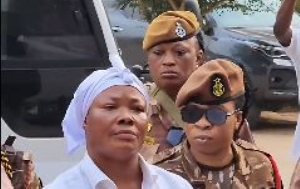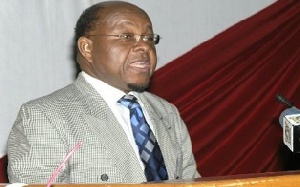This presentation is totally apolitical. It is an objective academic effort to interrogate an important national issue.
Article 125 (1) of the 1992 Constitution of Ghana says “Justice emanates from the people”. As Ghanaians we are all the owners of justice. But we cannot all sit as judges at any particular time. We need teachers, nurses, masons et al to do various jobs to build the nation. On our behalves judges sit to render justice so that criminals, wrongdoers will be brought to book and the rightful owners of land will have peace to develop them. Justice emanates from all of us and belongs to all of us. No one should forget this. Our judges are given independence, many privileges and even they receive FULL salary every month after retirement till death so that they will be above corruption while serving us.
The society at large and all men/women of goodwill are entitled to watch, observe and monitor judges at all times to see if they are administering well, what belongs to all of us.
In the past few years, corruption in the Judiciary has been in the public domain. The Chief Justice has persistently referred to the “perception” of corruption and the need to tackle it to save the judiciary.
Even Parliament has found it necessary to enquire into “The perception of corruption in the Judiciary”. Think Tanks – including IEA, CDD etc – have researched this “perception”. Debates have continued to soar and the “noble” institution endangered. A few years ago, Dr. Raymond Atuguba, an excellent academic and late Larry Bimi, came out categorically that several judges were corrupt and selling justice. Several citizens were disturbed. Lawyers and other commentators spoke about “perceived” corruption.
At one stage those who cried foul were refused appearance before judges. Others, including this writer, stated boldly that there were some clean judges in Ghana notwithstanding the probability of some corrupt ones. It will be unfair to paint the good and the bad, the beautiful and the ugly, with the same brush. This writer and others called for specific evidence in individual cases in the public interest.
One matter lingered after all the furore: Corruption in the Judiciary; Perception or Reality?
The Anas Intervention
By the grace of God, in defence of the Constitution and on behalf of the entire people of Ghana, from whom justice emanates, one bold and selfless citizen, decided to investigate/interrogate the matter of judicial corruption scientifically. He applied the ONLY method possible which now we all know of. He got results.
This Ghanaian did not just embark on a wild goose chase. He has a track record known to all. He has done this with regard to CEPS, DVLA, Children’s Home, Child Trafficking etc. This track record is important to this case. It shows motive. Presidents have acknowledged him. All have hailed his assiduity, principle and stand against injustice and corruption. These include judges, civil society, priests academics, politicians, et al. President Mills appropriately acknowledged his efforts. Indeed, his findings brought sanctions and reforms in the public sector. This cannot exclude the Judiciary.
Private investigators have become a complimentary arm of the State. They unearth evil and corruption and make the truth prevail.
In the application of modern jurisprudence, nobody should take seriously archaic issues relating to “entrapment” and being “set up” etc. The globalised world has to meet the challenges of corruption, money laundering/trafficking, cyber crime, professional judicial robbery etc. with fresh legal applications. Not long ago, you could not arrest a president and try him abroad for offences against his people. If Africa cannot meet the challenges of good governance and anti-corruption, very soon, our development partners will develop global principles and arrest and try our corrupt judges abroad for us. After all, they invest heavily in Africa and this includes investment in the Judiciary itself.
Today, Ghana has a Whistleblowers Act etc. Those who report criminal acts are rewarded by law.
Definitions
The Code of Ethics of the Ghana Journalists Association taking a cue from the Evidence Act provides:
“A journalist shall obtain information, photographs and illustrations, only by straightforward means;
The use of other means can be justified only by overriding considerations of the public interest”
What can be more “overriding” than the sanctity of the entire Ghana Judiciary?
An “Agent Provocateur” is a French expression which means an “inciting agent”. He may be a public officer or a private individual – secret agent. He usually sets a trap to test whether a person whose conduct is under investigation will fall into the trap.
Johnson gave us a good appreciation of what constitutes inducement thus: “An officer merely approaching a defendant and requesting that they commit a crime does not. To claim inducement, a defendant must prove he or she was unduly persuaded, threatened, coerced, harassed or offered pleas based on sympathy or friendship by police. A defendant must demonstrate that the government conduct created a situation in which an otherwise law-abiding citizen would commit an offense”.[i]
The Guilty and Innocent
I heard on radio, an argument that he who offers a bribe and he who accepts are both guilty. I have two arguments here: If both are guilty, let the judges go and answer their charges and let Anas go answer his. Can that prevent the judges from being prosecuted? No. And don’t you know that it is a simple practice in criminal prosecution that even among offenders, you charge the person who is the real criminal and use some other persons involved to secure conviction? Second, a crime comprises the actus reus (the action complained of ) and mens rea (the guilty mind – the evil motive). Both must be present to gain conviction. It may be said that both Anas and the judges did something ie giving bribe and taking. Fine. But what was the mind of the judge? Clearly it was to unlawfully enrich himself, doing something culpable. Of course there is guilt. What about the investigator? There was no criminal mind ( also called animus criminis). In fact, his mind was noble – to help clear up the controversy of judicial corruption and save Ghana from the collapse of the judicial system which lead to people taking the law into their own hands as we see today and the disrespect for judges (including the clean ones), as well as “revolutionary justice”.
Without a criminal intention, no action is by itself alone criminal. Let me give an illustration: A man is notorious for carelessly leaving his money about when drunk. One day, he dropped such money in his sitting room. Two friends took the money and handed it over to the wife to let him have it after 5 days to learn a lesson. If in the interim, the friends are charged with stealing they will not be guilty. They took the money all right but there was no criminal intent.
In the early years of the 31 December revolution, I was in the High Court building that fateful day when revolutionary forces wrongfully and violently took over the Supreme Court in the name of the Revolution and on behalf of the people. What happened should never re-occur. So we should develop proper methods to sanitise the system from time to time.
Global Practice
Modern developments in the laws of England, the US, India and Ghana have been analysed by this writer. The developments clearly favour the well-meaning investigator and patriot. No one should attempt to defend the indefensible and incur the wrath of the people from whom justice emanates.
India has made great progress in this regard and provides protection for informants/detectives. Hence, as Chief Justice Monir said, “if a person enters into a conspiracy, but for the sole purpose of detecting offenders and bringing them to book, he/she cannot be called an accomplice. Such a person is a mere informant and his/her evidence may be accepted without corroboration” Furthermore, the law protects persons “who have joined in, or even provoked or instigated the crime as (police) spies”. The reason is that “the object of the investigation in such cases is not the perpetration of the offence, but the detection of it; not the transgression of law, but the securing of evidence for the enforcement of public justice”. [ii]
It is incumbent on this writer to add that where the hands of the investigator are clean and his thoughts are seen as pure, no legal subterfuge should be allowed to grind the wheel of justice to an abortive halt.
In the US, a critical case arose called “Operation Greylord” in Chicago. Anyone who wants to speak on judicial corruption and some of the “defences’ being put up must read it. Go to Google. It will take only few minutes!
By 1980, the Chicago Judiciary was stinking with corruption. Bribes were offered rampantly: Judges had fallen into disrepute. So-called perception was rife! It had to be turned into evidence. “Operation Greylord” was mounted. Greylord came from the grey wigs worn by British judges, often called “My Lord”.
It was a three and half years operation in the early 1980s. Listening devices were placed in judges’ chambers; offices were bugged. This was necessary because of the secrecy and difficulty of detection of the criminal activity in question, the defendant’s circumstances and the nature of the offence. Several judges were caught, tried and jailed.
The USA situation is instructive. The Court held – Sherman V. U.S. - “To determine whether entrapment has been established, a line must be drawn between the trap for the unwary innocent and the trap, for the unwary criminal”. The judge who falls in the category of the “unwary criminal” must face the music. At the Bar Conference 2015 held in Kumasi, the Chief Justice noted that the Code of Conduct prohibits a judge discussing a case before him/her with others. I will therefore add that if a judge discusses a case, bargains and proceeds to take money, he/she has broken the rule twice over and has himself/herself to blame.
In the case U.S. v. Russell, the Court upheld conviction for manufacturing methamphetamine even though an undercover agent had supplied some of the ingredients.
If a person is predisposed to committing a wrongful act and he does so while being recorded, no amount of “entrapment” yells will enure to his benefit.
In the Ghanaian case, it is worthy of note that some judges refused to be “entrapped” and chased away the possible entrappers.
Subjective and Objective Test
Notably, this led to the “subjective” test in entrapment cases. This focused on the “state of mind” of the “entrapee” (the person who claims to have been entrapped). If greed clouds the mind of a judge and takes bribe to pervert justice, he cannot turn round and invoke entrapment to his legal advantage and be set free.
Further to the “subjective” test, the “objective” test has been developed. This focuses on whether the conduct of the police or other investigator would catch only those “ready and willing to commit crime”. Would the conduct of the investigator induce a law-abiding judge to turn criminal? That is the test. The answer is obvious in the Ghanaian case, all that was done by the investigator was to present a clear litmus test; the crooked fell in and the innocent even chased him away.
On the whole, when a criminally-minded person is ready and willing to break the law and commit a crime to enrich himself, there is no entrapment when an agent merely provides a favourable opportunity for the person to show his true character and commit the crime.
It will be an insult to common sense and the ends of justice to allow a judge to approbate and reprobate by keeping his ill gotten gain, feeding fat thereon and continuing to do so and say the law cannot touch him. And such a person says he should be allowed to continue sitting as a judge feeding fat on his bribe monies and other spoils. Society will rise and protest.
Aftermath
What has been the outcome and follow-up to cases such as the Chicago Corruption Case? First, complainants complained that where corrupt judges had acquitted accused persons, there should be a re-trial. Those accused persons then invoked the “double jeopardy” rule, known in all common law nations of the British tradition. That is you cannot try a person twice for the same offence. With time, the US Supreme Court and other Courts upheld that where acquittals are tainted with fraud, they should be distinguished since fraud vitiates everything. Other trials were held thereafter and convictions obtained where applicable. This is a lesson for Ghana.
In other cases it also transpired that such “corrupt” judges were harsh and cruel to people who did not give bribes and pronounced them guilty or gave them harsh sentences so as to “balance the equation” and give impression that they were fair and upright judges. Many of such cases were retried. These are vital lessons for us as well.
No anti-corruption fight can succeed in Ghana if the judges themselves are corrupt. In the end, corruption will destroy Ghana as a whole. Monies and resources to assist the poor and vulnerable will land in the pockets of corrupt rich people. The hope of the majority will be lost and revolutionary violence will erupt. This is the lesson of history. If the Judiciary cannot be trusted, land guards, instant mob justice etc will prevail and get worse. Do we want to see the worst before we sit up?
To prove that a judge has taken a bribe to fix a case is extremely difficult. This is particularly so because of the consensual nature of bribery. You do not expect the judge who is the taker, nor the party in the case who benefits from the criminal act, nor the betweener who facilitates the crime and takes a cut, to reveal the offense.
Indeed each one keeps it “secret”. Therefore, to move judicial corruption (which actually exists) from the “perception” stage to the “reality” level, you need under-cover agents. This is what happened in Chicago and other places. This is what has happened in Ghana. Swift action must be taken to applaud the effort. If any mistakes occurred, in the process of investigation they should be corrected and all actual culprits dealt with.
Conclusion
A thousand wolves have been cried about perception of judicial corruption. It has been perception, perception, perception. Now it is evidence, evidence evidence. Nobody can by any means whatsoever stand in the way of the Truth. No one can prevent the interrogation of this matter to its logical conclusion.
If the judges or any one attempts to take from the people, that which emanates from the people, we will deviate from the path of justice being pursued in the present world. We will see the wrath of our people to whom justice belongs and from whom justice emanates.
To be judge over your fellow man is to stand in the place of God on earth. It is a grave responsibility. This is because God Himself is the ultimate judge. To abuse this trust is a most heinous crime.
[i] See Jennifer Johnson, The Entrapment Debate: Are Undercover Investigations Egregious Conduct or Law Enforcement? Sourced from: http://grayarea.com/entrap.htm
[ii] See Chief Justice M. Monir, Law of Evidence, vol. 2, Delhi, Universal Law Publishing Company, 2004, p. 1386.
General News of Monday, 21 September 2015
Source: Professor Mike Oquaye
“Issues of Justice and judicial corruption” - Prof. Mike Oquaye writes
Entertainment












